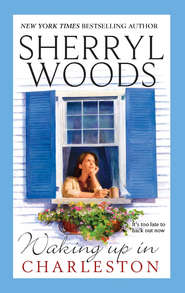По всем вопросам обращайтесь на: info@litportal.ru
(©) 2003-2024.
✖
Tea and Destiny
Автор
Год написания книги
2018
Настройки чтения
Размер шрифта
Высота строк
Поля
“Sorry about Melissa,” she apologized distractedly, fingering a head of lettuce. Lettuce was good. The choke hold this bearded giant of a man seemed to have over her senses was not. She swallowed hard. “I gather she’s responsible for this.”
“If she’s about so high and partial to her thumb, she’s the one,” he acknowledged with a smile that made her stomach do an unexpected flip. “Did I frighten her or something? I asked where her mommy was and she let out a war cry that would have straightened the hair on Hitler’s head.”
Ann struggled with the unfamiliar sensations that continued to rampage through her, decided her panic at Melissa’s scream was to blame and reclaimed a bit of control.
“So that’s it,” she said, satisfied with the explanation for her nervousness and oblivious to Hank’s confusion.
He was regarding her oddly. “That’s what?”
She tried frantically to recall what he’d just said. Something about Melissa’s mother and Hitler? She wasn’t sure what the Nazi connection was, but she understood precisely what had happened when Hank had mentioned the child’s mother.
“I wondered what brought on all the tears. She came in crying about some man.”
“Which explains the butcher knife.”
She glanced down at the weapon she’d grabbed on her way out the door. It was lying at her feet. “Oh, sorry.”
“Don’t be. In this day and age, I don’t suppose a woman can be too careful,” he said, reaching down to pick it up. “Since you didn’t use it on me, I gather you’ve decided I’m harmless.”
Harmless? No less than a pit of vipers. How had she forgotten that he had this strange effect on her? All she’d recalled after the wedding had been his infuriating habit of contradicting every opinion she held.
“Maybe I’d better explain about Melissa’s mother,” she said, clinging to a neutral topic. “The woman abandoned her a year ago, just took off without a word to anyone. A neighbor found Melissa all alone the next day. They say children adjust pretty easily, but Melissa hasn’t. She still wakes up in the middle of the night crying for her mother. Any reminder tends to set her off.”
Professional training kept her tone matter-of-fact, but she still seethed inside when she thought about it. “It’s beyond me how a mother could leave a child all alone like that. Anything could have happened to her. What if there’d been a fire? Good God, can you imagine?” she said, shuddering visibly. “Even waking up and being all alone would be enough to terrify a baby. When the social worker told me about it, I felt like going after the woman myself. No wonder Melissa’s not adjusting.”
Hank muttered what sounded like an indignant curse under his breath, then said, “I’m sorry. I had no idea. I guess I was just thinking of you as her mother.”
“We don’t do a lot of swearing around here,” she warned automatically. “The kids, well, some of them anyway, are at that impressionable age. As for Melissa, she calls me Ann. Some of the kids refer to me as Mother. It all depends on what they’re comfortable with. Since you’re going to be here awhile, I’ll give you a rundown on each of them, so you’ll understand how they ended up here. The older ones are pretty open about things, but the little ones are still a little sensitive.” She fingered a package of cupcakes, regarded them distastefully and sighed. “Then there’s Jason. He rarely talks at all.”
Hank didn’t seem to notice the fact that she couldn’t shut up. In fact, he looked decidedly uneasy. “How many are there?” he asked, as if he were inquiring about enemy troops just beyond a strategic hill.
“Five. Six. It depends on whether Tracy stays with friends after her classes at the junior college in Key West. Tonight they’re all here. Occasionally one of the kids who used to live here comes back for a visit.”
Hank, a man who struck her as big enough and tough enough to fear nothing, seemed to take a panicky step closer to his truck. He looked as though he wanted to escape. She could relate to the feeling. She’d felt that way since the instant she’d spotted him standing in the yard in faded jeans, a body-hugging T-shirt and sneakers. He hadn’t seemed nearly as devastating in the suits he’d worn the weekend of the wedding.
“I probably won’t see all that much of them,” he said, an edge of desperation in his voice. “I’ll be working pretty long hours.”
She waved aside the objection. “Nonetheless, it’ll be better if you know. Come on in now and I’ll show you around.”
She led him in through the kitchen, simply because it was closest. It was also a mess, as it always was by Sunday night after a weekend of having everyone at home. She saw Hank’s eyes widen at the sight of dishes stacked all over the counter and tried to view the clutter from the perspective of a bachelor who probably paid a maid to do his housework.
Toys were scattered all over the floor and her papers were strewn across the round oak table that could seat ten easily and usually was surrounded by that many or more, all trying to talk at once. It was chaotic, but she loved the happy confusion. She could understand, though, how it might seem daunting and disorganized to an outsider. She shrugged. He’d just have to get used to it.
“We have cleanup in another hour,” she said, stepping over a toy tank and rolling a tricycle out of their path as she plopped the groceries on top of the stove. “It’s hard to imagine now, but by the time we sit down to dinner, this room will be spotless. Look quick, though, because it’ll only be that way about twenty minutes.”
Hank was still standing uncertainly in the doorway. “Are you sure I’m not putting you out? I know you told Liz it would be okay, but…” He waved a hand around the room. “You seem to have enough on your hands.”
“Can you do your own laundry?”
“Yes, but…”
“Make your own bed?”
“Of course, but…”
“Are you any good at making coffee?”
“Yes, but…”
“Then it’s no problem.”
Almost as soon as the words were out of her mouth, Ann regretted them. If he wanted to run for his life, she should have let him. She should have encouraged him.
When Liz had first approached her about helping Hank out, she’d been adamantly against it. The man was the epitome of everything she disliked in the male of the species. He was handsome in some indefinable way that made him all the more dangerous. He had the powerful shoulders and chest of a lumberjack. He managed to have a light tan on slightly freckled skin that by all rights should only turn beet-red in the sun. His hair and beard were a golden shade just shy of red. He had laughing blue eyes that could undress a woman in ten seconds flat, usually before the introductions were completed. He was bold and brash and irritating. His treatment of women had all the finesse of the caveman’s, yet they flocked to do his bidding. With a reaction that was part astonishment, part dismay, she’d observed his effect on them at the wedding.
To top it off, his opinions on most subjects were diametrically opposed to her own. At the rehearsal dinner they’d been barely civil to each other. Their introduction had quickly escalated from hello into an argument about something so inane she couldn’t even recall it now. It might have had something to do with the hors d’oeuvres. Liz had witnessed the clashes with interest, which made her plea to Ann for help all the more unbelievable. Ann realized later it should have made her suspicious at once.
“Think of him as a project,” Liz had challenged. “You’ll have weeks to work on him.”
“I have six kids staying with me, plus a full-time career. I don’t need a project. I need a maid.”
“You need a man.”
“Oh, no, you don’t,” Ann said, just catching on to the direction of her friend’s devious thoughts. “Just because you’re crazy in love and radiantly happy doesn’t mean that everyone aspires to the same state of marital bliss. I do not need a man. I especially do not need a man who thinks that watching wrestling is cultural.”
Liz had laughed. “Hank does not watch wrestling.”
“Okay, maybe it was tractor pulls.”
“You’re just a coward.”
“Hardly. I just don’t have time to waste trying to rehabilitate a thirty-seven-year-old man. It’s too late.”
“You’re a psychologist. You know perfectly well it’s never too late to reform someone.”
“If they want to be reformed. What gives you the idea that Hank Riley has any desire to change?”
“Think of it as an experiment. You could probably get a great research paper out of it.”
“You’re stretching, Liz.”
“I’m desperate,” Liz had admitted finally. “I already told him you’d do it.”
“Why on earth would you do that?”
“It was a calculated risk. When have you ever turned down a stray?”
“Hank Riley has a home to go to. From everything you’ve told me and my own observations, he has more women to look after him than Hugh Hefner. He does not need me.”











